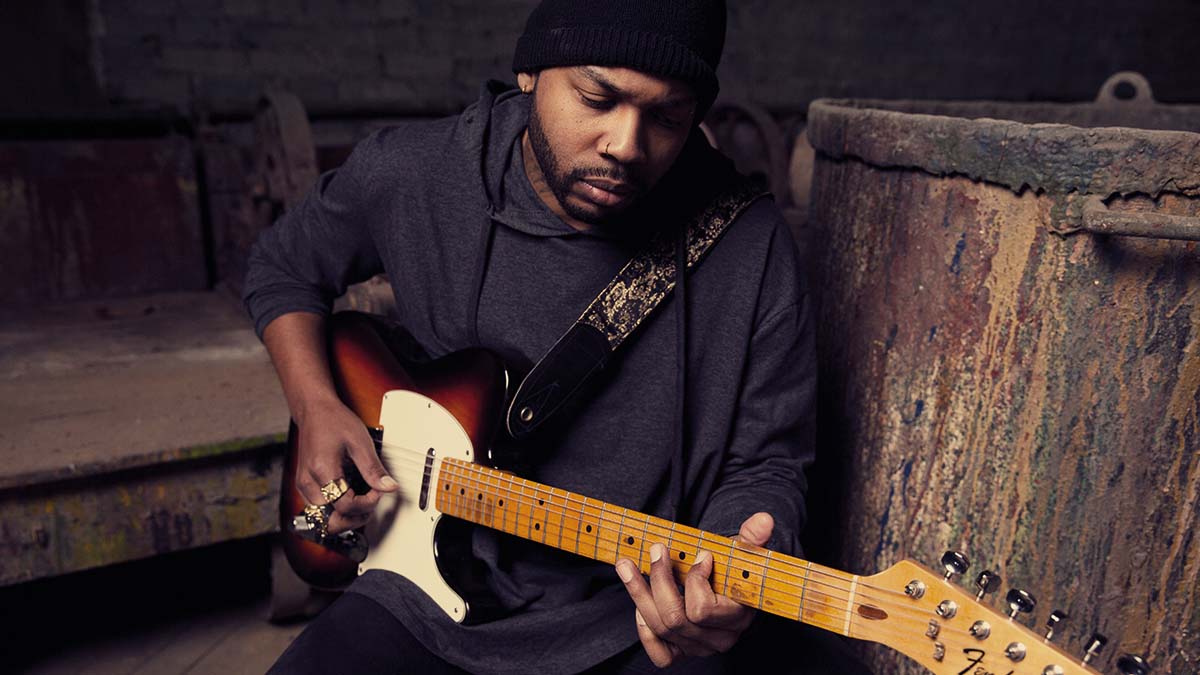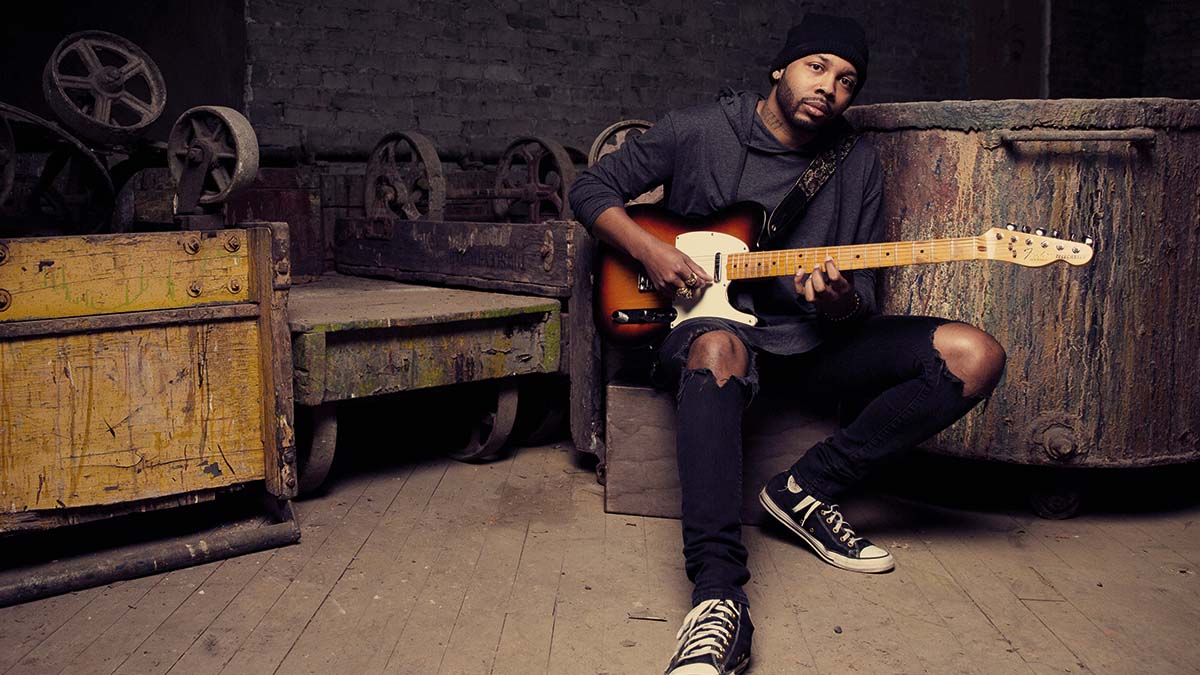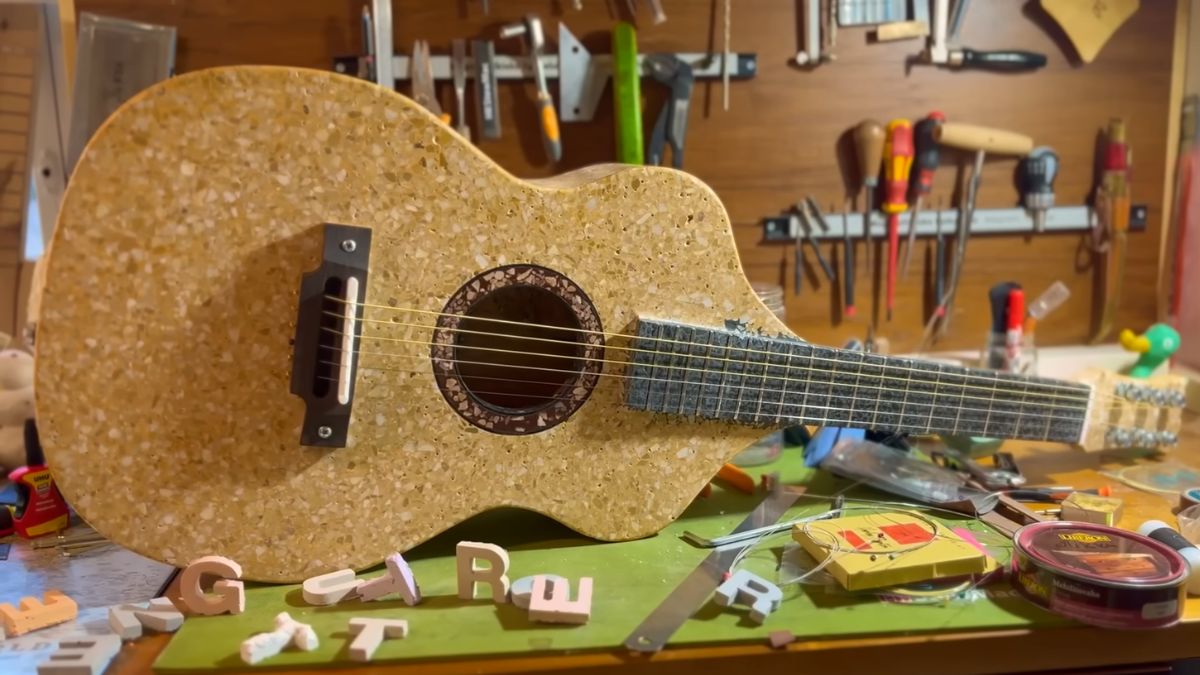Ayron Jones: "I can’t say the guitar provided me with a direction – the guitar became an obsession, and that’s what provided the direction"

One thing Ayron Jones makes clear right from the get-go: When he straps on a guitar, he isn’t about to play nice. “I like to attack the instrument,” he says. “I’m almost like Bruce Lee when it comes to playing. Because I’m self-taught, I don’t always fit into the standard forms of expression or what might be acceptable, so I kind of punch my way through.”
He laughs and adds, “Whatever it takes to get my point across, I’ll do it, man. If it hits you upside the head, then I’ll know I did my job.”
The Seattle-based singer, songwriter and guitarist goes bold in the opening seconds of his dynamite new album, Child of the State. Following a tense, turgid guitar riff , he sings defiantly, “I heard you called the fucking police, ’cause we the baddest band in town” on the rollicking opening cut, Boys from the Puget Sound.
Clearly, he knows how to make a quick impression. “I definitely want to get your attention, and sometimes that calls for a smack in the face,” he says. “But I don’t want to be seen as some sort of provocateur. I want to promote conversation rather than try to provoke any sort of negative emotions. But sometimes the best way to get dialog going is by being direct. Whatever works.”
Child of the State is Jones’ third album, but in many ways it feels like something of a coming-out party. Following two respectable indie releases (2013’s Dream and 2017’s Audio Paint Job) with his then blues-rock power trio, Ayron Jones and the Way, he went solo last year and signed with Big Machine/John Varvatos Records. The move to a major label is an opportunity he didn’t squander, as Child of the State is a blistering, daring and thoroughly rewarding affair.
The album’s knockout first single, Take Me Away, an unflinching portrait of his troubled youth that blends grunge, blues and pyrotechnic art-rock guitar noise, landed Jones at the upper regions of Billboard’s Mainstream Rock Songs chart. Next up was Mercy, a bruising anthem written during the peak of last year’s BLM protests that featured corrosive rhythms and an epic, spiraling guitar solo.
The rest of the album lives up to the promise of its pre-release tracks. Supercharged, Killing Season and Free roil and rage with tectonic force while Jones fires off searing bolts of feedback-driven lightning. Between furious rock beatdowns, however, he varies the pace: Spinning Circles is a mid-tempo, psychedelic pop gem, and on the sinuous groover Baptized he gets positively soulful.
Get The Pick Newsletter
All the latest guitar news, interviews, lessons, reviews, deals and more, direct to your inbox!
A standout moment comes in the form of My Love Remains, an unapologetically tender ballad on which Jones pledges undying passion amid enveloping guitar fury.

For Jones, who recorded the album in Seattle and Nashville with a variety of producers (most notably Eric Lilavois and Barrett Martin), Child of the State is the kind of album he’s long aimed at.
“When you’re an indie artist, you hit a ceiling that you can’t break until you get in with the right people,” he says. “I hit that ceiling, and it was a matter of figuring out how to get in with the right people to really get that point across. Fortunately, I have those folks beside me now, and I went for it. But I’ve been seasoned. Doors just didn’t fling open magically for me. I paid my dues and opened those doors for myself. I’m ready to fly.”
By all accounts, you didn’t have an easy early life; you were a foster child before you were raised by your aunt. When you discovered the guitar, did it seem like something that was going to provide you with a direction?
“I can’t say it provided me with a direction; rather, the guitar became an obsession, and that’s what provided the direction. Even up until 2010, I was still playing in the bars and clubs in Seattle, and I didn’t really think I wanted to be a recording artist at that time.
“I was still doing three-hour gigs here at the pub down the street. It wasn’t until I started playing with this punk band, Deep Cotton, and we were opening for Janelle Monae, that I was inspired to go off and really do it. Being around Janelle and seeing her do her thing gave me the push I needed.“
Janelle wanted you to play for her, but you decided to go off on your own.
“Her producers wanted me to stay. They had their own punk band, and they wanted me to be part of it. It was hard to turn down, because it would have provided me an income, but I felt like if I had done that, I wouldn’t have had the opportunity to get where I am today. I turned it down in order to pursue my own project.“
As a self-taught guitarist, how did you put in the “10,000 hours” people always talk about?
“Like I said, the guitar became an obsession. When I get into something, I want to be good at it. I want to be the ultimate. And at a young age, I sat and listened to records – Stevie Ray Vaughan, Jimi Hendrix, Albert King, all these old blues cats. I tried to emulate those sounds.
“There was definitely a lot of practice. But it was always my dream to get on the stage, and that’s where those 10,000 hours came in. I was in the bars and clubs, just grinding it out. That’s how I really advanced as a guitar player.“
One can definitely hear grunge in your music. Was it hard to escape that influence growing up in Seattle?
“Definitely. There’s nowhere you could have gone in the '90s without hearing grunge music. We were consumed by it; it seeped into our pores. And also, just as I started opening doors for myself, I found myself in the company with all the old grunge guys.
“I started working with Barrett Martin from the Screaming Trees, and he kind of taught me how to grab that Seattle sound and put it on the record. When you listen to those grunge records, you pick up so much. Using a Leslie sound on your guitar – that was a big thing.“
There's also a bit of Tom Morello in your playing; you have the same kind of derring-do spirit.
“Absolutely. I grew up listening to Rage Against the Machine, and I definitely familiarized myself with Tom Morello. You listen to Take Me Away – it’s a powerful song, and it’s got grunge, but it’s also got Tom Morello. It was only fitting for me to pay homage to him in that song.“
You’re a big Strat player. Was that always the case?
“Pretty much. I play some Gibsons – some SGs, a Thunderbird and a Les Paul. They fill out the tones. But yeah, I’m a big Strat guy. I’ve got a Fender American Pro and a couple of HH Strats. I used to have a main Strat, but I smashed it at a show when I was all caught up in the moment. I regretted it afterwards. [Laughs]“
How did you go about matching guitar to amp to effects, figuring out your sound?
“That took me years, a lot of trial and error. One big thing was when I played a show with Lukas Nelson. I jammed with him on Little Wing, and I just couldn’t match his tone. His sound was so much fuller and bolder without being distorted or overdriven. I couldn’t understand it. That’s when I realized he was going through a stereo amp setup, and I picked up on that. From that moment forward, I’ve used a stereo setup.“
“In the studio, I go through a Hiwatt and a Marshall JCM800. Live, I use a Dr. Z Maz 38 Sr. and a Fender Hot Rod Deluxe. It took me a while to land on those two setups. As for effects, I use a Boss DS-1 distortion and a TS9 Tube Screamer, and there’s an [FX Engineering] Moab Boost pedal and a Boss PS-6 Harmonist. I also use a tape echo and a wah. I forget which wah it is.“
I like it to sound unsettling. Music should have very specific dynamics – that’s how you create drama
There’s a lot of tension in the riffs to songs like Take Me Away, Free, Killing Season and Mercy. Do you notice that?
“Definitely. I like it to sound unsettling. Music should have very specific dynamics – that’s how you create drama. Growing up in Seattle, there was Nirvana and Mudhoney, and they had that soft/loud thing with real breakout choruses. They had this tension and release. I picked up on that with riffs and arrangements. It’s the set-up and the pay-off.“
You also like a lot of feedback and string scratches, things some guitarists try to remove from their sound.
“For sure. I like it raw and tough. I get into that live, but I also like to bring that energy to the studio. Feedback is natural. Scratching your strings is natural. It’s what happens when you’re playing, so why not use it?“
Are your solos improvised? Killing Season has a pretty epic rock-star solo, but there’s a randomness to the way you roll the notes out.
“They’re super-improvised. I play them a million different ways. Typically, I don’t write solos out. I just throw stuff against the wall and see what sticks. It doesn’t have to be a crazy, 'out there' solo; it just has to have a vibe. That’s the way I feel about music in general: if you can’t feel a vibe, it’s just not worth it.“
- Child of the State is out now via Big Machine/John Varvatos Records.
Joe is a freelance journalist who has, over the past few decades, interviewed hundreds of guitarists for Guitar World, Guitar Player, MusicRadar and Classic Rock. He is also a former editor of Guitar World, contributing writer for Guitar Aficionado and VP of A&R for Island Records. He’s an enthusiastic guitarist, but he’s nowhere near the likes of the people he interviews. Surprisingly, his skills are more suited to the drums. If you need a drummer for your Beatles tribute band, look him up.
“There’d been three-minute solos, which were just ridiculous – and knackering to play live!” Stoner-doom merchants Sergeant Thunderhoof may have toned down the self-indulgence, but their 10-minute epics still get medieval on your eardrums
“There’s a slight latency in there. You can’t be super-accurate”: Yngwie Malmsteen names the guitar picks that don’t work for shred






![A black-and-white action shot of Sergeant Thunderhoof perform live: [from left] Mark Sayer, Dan Flitcroft, Jim Camp and Josh Gallop](https://cdn.mos.cms.futurecdn.net/am3UhJbsxAE239XRRZ8zC8.jpg)









